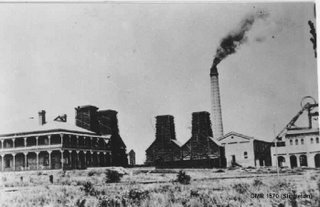However, I'm lifted by the quiet elation that follows a win over writer's block. I'm moving through the autobiography of the novelist Kylie Tennant, convinced hers is a story which would fascinate today's readers, and a good subject for one of the essays in a website I hope to develop.
About 1950, this country schoolteacher's wife lived in the inner Sydney slums with prostitutes to gather material for a novel, and managed to be jailed in Long Bay for a week, making friends of the mattress workers sharing her dormitory.
As I read Kylie Tennant's story, the ABC radio beside my desk says a man has been charged with the murders of five prostitutes in England. I reflect that the British media have depicted the victims as ordinary women, albeit driven by drug habits. Does that reflect a shift in public attitudes to sex workers?
I remember a young woman with whom I enjoyed a chat early this year. She crept up as I sipped a beer in my favorite pub, and asked for a few dollars. A good hard luck story. Her husband had emptied her bank account. I reached into my pocket.
Candy – that's not her name, but if you've seen the film you'll get the picture – looked from side to side, leaned forward, and said: “Actually, what I really need is forty dollars, and I could make it worth your while.”
I could only stammer: “I'm almost seventy – I couldn't ...”
The change in her demeanour startled me. No longer a beggar, she had become the artisan confident of her skill. “I can get you up,” she said.
But where would we go? “You've got your car?” Well, no, actually, I rode my bicycle up to the pub. Candy thought for a moment, then asked:
"You know those old tennis club buildings over in the park?”
It was time to explain to Candy that commercial sex was unlikely to turn me on – and certainly not in the filth of a derelict squat. I expected her to move on, but she stayed and we chatted, moving to another bar so she could scrounge a light.
She insisted she'd completed a methadone program and was now clean. What about those tracks? – I'd never seen a woman with such badly scarred arms. They're old, she said. What about those blue bruises above your elbows? My husband did that when he hit me. (Later, a friend tells me such bruising can result from injecting methadone, a syrup which needs to be pushed in with a horse needle.)
I enjoyed our chat, and the unexpected rapport which developed. I liked Candy. And yes, I did offer to lend her forty bucks. There's no fool like an old fool.
I thought I'd seen both Candy and my forty bucks for the last time. I was right about the forty bucks, but wrong about Candy. About two weeks later she came in, looking for me.
She looked jittery. High perhaps, or hanging out for the next deal. “I'm going into the city,” she said. “I'm working tonight. Know what I mean?”
Oh, Candy. You told me you weren't using any more. “I'm not, but I've got a lot of bills to pay.”
But what of the danger? What if you get bashed, or killed? “It's all right. My husband comes too, and he takes down the car number plates.” And what good will that do if you go off with a psycho? I leave the question unasked.
As she leaves, I wonder why Candy went out of her way to tell me of the night's plans, and I believe she saw me as a friend, someone non-judgmental in whom she could confide. It was flattering, but I believed she was still using drugs. That, sadly, is a compelling reason not to develop a friendship.
Q. How do you know a heroin addict is a true friend?
A. They post you the pawn ticket so you can get your valuables back.
A few months later, I learn Candy is in jail. Is she coping? Candy might have street smarts, but can she handle the heavies inside? I decide to send a Christmas card, but I'm too late. She's been released. I've lost contact.
But I thought of her yesterday, as my wife Merry and I joined our children and their partners, and our grandchildren, in a happy Christmas picnic beside Lake Macquarie.
How did Candy spend Christmas? Is she drug-free at last, attempting to reconcile with the family who had given up on her? Or was she still in that sad line of zombie dolls on the kerb, enslaved by a master which allows no holy days?
If I have a Christmas wish, it's that one day soon a confident and attractive young woman will walk up. “Hi, remember me?” “Of course, Candy, how are you travelling?” This time, she'll be able to tell me the truth.




